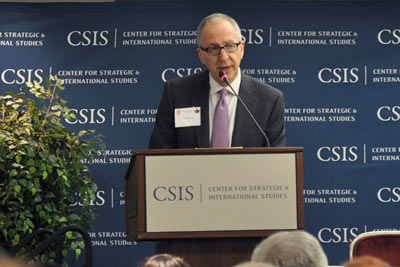New CARE-Cornell partnership to take on global concerns

Cornell and the global humanitarian organization CARE have launched CARE-Cornell -- a partnership that will merge Cornell's cutting-edge research with CARE's experience fighting poverty to create solutions for global concerns, including world hunger and climate change.
The partnership is focused on the world's most vulnerable populations.
"Our goal in this strategic partnership is to advance sustainable food systems, to strengthen the ability of women and their families, many of them facing chronic, severe food insecurity, to fight hunger and to adapt to climate change," said Cornell President David Skorton at the partnership's official launch, April 17, at the Center for Strategic and International Studies in Washington, D.C.
"Each of us, CARE and Cornell, brings to the table some expertise and capabilities that will enhance and extend the other's impact," he added, saying that if it proves successful, this "unparalleled partnership between a major NGO and a university … may turn out to be a model for more such partnerships."
Spearheaded by Cornell's Atkinson Center for a Sustainable Future (ACSF), CARE-Cornell provides financial support for international projects through the Impact through Innovation Fund, supplemented by competitive external grants written by teams of Cornell faculty members and CARE staff. The fund and partnership were established with generous gifts from David '60 and Pat Atkinson.
Projects under way or in initial stages include:
- In Ethiopia, biofertilizers made from local wastes will replace costly fertilizer imports thanks to a CARE-Cornell team at work fostering new business opportunities and an increase in local crop yields.
- In Mozambique, a CARE-Cornell team is analyzing the effectiveness of incentives offered to health care workers to prevent the transmission of HIV from mother to child.
- In Vietnam, a team is adapting pyrolytic cook stoves for the Mekong region and using the charcoal that is left over -- a form of biochar -- as a soil additive to boost fertility.
- In Sierra Leone, a team aims to promote economic opportunity and the sustainable livelihoods of communities living adjacent to and in the buffer zones of Outamba-Kilimi National Park while sustainably conserving and managing the biodiversity and natural resources base of the area.
- In Zambia, the partnership is working to protect household poultry production against disease, introduce new markets and pilot village egg-layer facilities that are providing critical sources of income and micronutrients for women and children.
"Few if any university-NGO strategic partnerships exist, and none but CARE-Cornell has dedicated, central funding to develop an integrated research-outreach-action agenda that proactively tackles entrenched barriers to food security and women's empowerment," said Chris Barrett, the Stephen B. and Janice G. Ashley Professor of Applied Economics and Management, professor of economics and ACSF associate director. The partnership also is defining a shared learning agenda to identify the major tipping points to strengthen resilience of chronically food insecure women and their families, he added.
In addition, the partnership "promotes face-to-face, real-time collaboration between Cornell researchers and CARE fieldworkers that will foster the innovation we need for game-changing approaches," said CARE President and CEO Helene Gayle. "Having top researchers in the communities where CARE works will help us quickly develop and refine innovative solutions to chronic problems faced by marginalized women and their families."
CARE is a leading humanitarian organization fighting global poverty. It places special focus on working alongside poor girls and women because, equipped with the proper resources, they have the power to lift whole families. Last year CARE worked in 84 countries and reached 122 million people around the world.
Media Contact
Get Cornell news delivered right to your inbox.
Subscribe